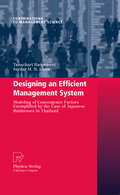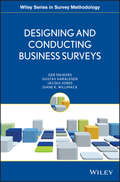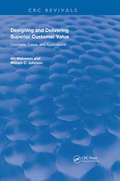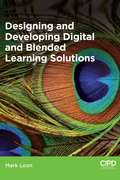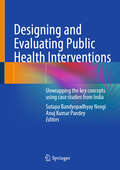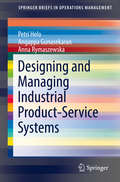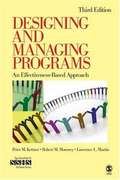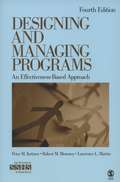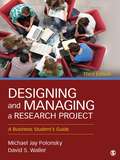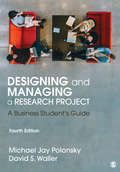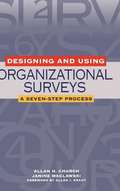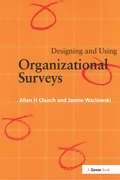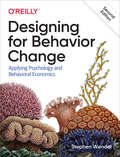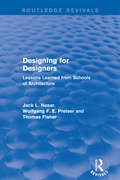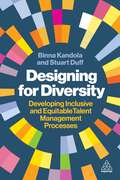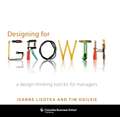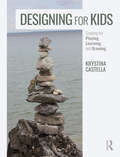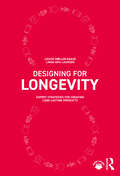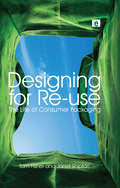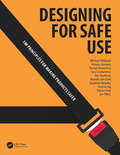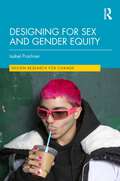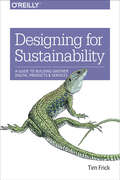- Table View
- List View
Designing an Efficient Management System
by Sardar M. Islam Tanachart RaoprasertThis book makes a significant and valuable contribution to the literature in the fields of organisational behaviour and design, performance analysis and structural equation modelling. The subject of this book is the development of an efficient and effective management system in the globalised world in order to improve overall organizational performance to achieve good corporate governance by reducing agency costs in a cross-cultural environment. Based on an empirical case study of Japanese management practices in Thailand, it examines factors that help to adapt management practices to the work culture of the host country and motivate local employees to adapt and implement unfamiliar management practices. The book provides a new methodological approach by applying structural equation modeling to psychosocial and motivational constructs of organizational performance, and thus presents an innovative behavioral framework of organizations in a contemporary cross-cultural setting.
Designing and Conducting Business Surveys
by Ger Snijkers Gustav Haraldsen Jacqui Jones Diane K. WillimackDesigning and Conducting Business Surveys provides a coherent overview of the business survey process, from start to finish. It uniquely integrates an understanding of how businesses operate, a total survey error approach to data quality that focuses specifically on business surveys, and sound project management principles. The book brings together what is currently known about planning, designing, and conducting business surveys, with producing and disseminating statistics or other research results from the collected data. This knowledge draws upon a variety of disciplines such as survey methodology, organizational sciences, sociology, psychology, and statistical methods. The contents of the book formulate a comprehensive guide to scholarly material previously dispersed among books, journal articles, and conference papers. This book provides guidelines that will help the reader make educated trade-off decisions that minimize survey errors, costs, and response burden, while being attentive to survey data quality. Major topics include: * Determining the survey content, considering user needs, the business context, and total survey quality * Planning the survey as a project * Sampling frames, procedures, and methods * Questionnaire design and testing for self-administered paper, web, and mixed-mode surveys * Survey communication design to obtain responses and facilitate the business response process * Conducting and managing the survey using paradata and project management tools * Data processing, including capture, editing, and imputation, and dissemination of statistical outputs Designing and Conducting Business Surveys is an indispensable resource for anyone involved in designing and/or conducting business or organizational surveys at statistical institutes, central banks, survey organizations, etc. ; producing statistics or other research results from business surveys at universities, research organizations, etc. ; or using data produced from business surveys. The book also lays a foundation for new areas of research in business surveys.
Designing and Delivering Superior Customer Value: Concepts, Cases, and Applications (Routledge Revivals)
by William C. Johnson Art WeinsteinFirst Published in 1999: This book stresses the service aspects of an organization - especially customer service, marketing, and organizational responsiveness, and how to create and provide outstanding customer value to the target market(s).
Designing and Developing Digital and Blended Learning Solutions
by Mark LoonDesigning and Developing Digital and Blended Learning Solutions is essential reading for anyone studying the Level 5 CIPD L&D module of the same name as well as all learning and development professionals looking to understand the growing role of technology in L&D. Covering both current and emerging learning technologies, this book will help readers assess which technologies are right for their needs. It also covers how to design blended learning solutions, how to develop digital learning content as well as how to evaluate the effectiveness of this digital content. Most importantly, Designing and Developing Digital and Blended Learning Solutions provides guidance on how to implement digital and blended learning solutions including identifying the appropriate platforms and the roles, tools and processes needed to support effective implementation. Full of practical examples and advice, this is an invaluable guide for students and practitioners alike.
Designing and Evaluating Public Health Interventions: Unwrapping the key concepts using case studies from India
by Sutapa Bandyopadhyay Neogi Anuj Kumar PandeyThis book covers all aspects of public health interventions, emphasizing the design, implementation, and evaluation of such initiatives. Section I provides information ranging from fundamental concepts of designing an intervention to its implementation and scalability. Section II highlights evidence around interventions to address pressing public health concerns through interesting case studies from India, that offer practical insights for better understanding. This book is relevant for researchers and academicians in public health, epidemiology, health management and economics, health policy, and allied branches. It equips readers to design and analyze interventions to improve practice.
Designing and Managing Industrial Product-Service Systems
by Petri Helo Angappa Gunasekaran Anna RymaszewskaThis book is dedicated to the issues and complexities of industrial services supply chain management. It analyzes how the transition from products to services can be managed, and how supply chains can be adjusted to reflect this new status quo. The book begins with chapters examining product-service systems structures and servitization - the services infusion process. Next, it presents industrial services as marketing and operations strategy. The focus shifts to service delivery, and this chapter discusses how the actual operations take place. This is followed by an examination of the role of technology and how connected assets are utilized by product vendors in value-creation. The book analyzes the transition from ownership to subscriptions in the pricing decisions chapter. Then the value chain effects chapter offers an overview of the mechanisms through which industrial companies are shortening the distance to end-users and aim for a better position in the value chain. Finally the conclusion addresses theoretical and empirical implications in the industrial services supply chain management.
Designing and Managing Programs: An Effectiveness-Based Approach
by Peter M. Kettner Lawrence L. Martin Robert M. MoroneyDesigning and Managing Programs: An Effectiveness-Based Approach, Third Edition, is an updated version of THE classic book on program management and design. This new edition is written in a deliberate manner that has students following the program planning process in a logical manner. Students will learn to track one phase to the next, resulting in a solid understanding of the issues of internal consistency and planning integrity. The book's format guides students from problem analysis through evaluation, enabling students to apply these concepts to their own program plans.
Designing and Managing Programs: An Effectiveness-Based Approach
by Peter M. Kettner Lawrence L. Martin Robert M. MoroneyDesigning and Managing Programs: An Effectiveness-Based Approach, Fourth Edition, is an updated version of THE classic book on program planning, design, and implementation. This new edition is written in a deliberate manner designed to help students logically follow the program planning process. Students will learn to track one phase to the next, resulting in a solid understanding of the issues of internal consistency and planning integrity. The book's format guides students from problem analysis through evaluation, enabling them to apply these concepts to their own program plans.
Designing and Managing a Research Project: A Business Student's Guide
by Michael J. Polonsky David S. WallerDesigning and Managing a Research Project: A Business Student’s Guide, Third Edition is a practical, step-by-step guide that shows business students how to successfully conduct a research project, from choosing the topic to presenting the results. Michael Jay Polonsky and David Scott Waller have applied their many years of experience in supervising student projects to provide examples of actual research problems and to offer practical solutions. Unique to this book is the inclusion of chapters on topics such as supervision, group work and ethics, and both qualitative and quantitative data analysis, with links provided to a range of online resources, as well as examples from student projects.
Designing and Managing a Research Project: A Business Student's Guide
by Michael J. Polonsky David S. WallerDesigning and Managing a Research Project: A Business Student’s Guide, Third Edition is a practical, step-by-step guide that shows business students how to successfully conduct a research project, from choosing the topic to presenting the results. Michael Jay Polonsky and David Scott Waller have applied their many years of experience in supervising student projects to provide examples of actual research problems and to offer practical solutions. Unique to this book is the inclusion of chapters on topics such as supervision, group work and ethics, and both qualitative and quantitative data analysis, with links provided to a range of online resources, as well as examples from student projects.
Designing and Managing a Research Project: A Business Student′s Guide
by Michael J. Polonsky David S. WallerDesigning and Managing a Research Project: A Business Student’s Guide is a practical, step-by-step guide that shows business students how to successfully conduct a research project, from choosing the topic to presenting the results. The authors have applied their many years of experience in supervising student projects to provide examples of actual research problems and to offer practical solutions. The inclusion of topics such as supervision, group work and ethics, and both qualitative and quantitative data analysis, along with examples from real student research provide a unique perspective. The new Fourth Edition includes broader types of student project examples, such as an Economics thesis, additional international business cases, increased coverage of Questionnaire Design and Institutional Review Boards, and an integrated case throughout the book on "High Performance Shoes" with supporting materials and data. Additional resources including case studies, PowerPoint slides, and test bank are available on the authors’ website.
Designing and Managing a Research Project: A Business Student′s Guide
by Michael J. Polonsky David S. WallerDesigning and Managing a Research Project: A Business Student’s Guide is a practical, step-by-step guide that shows business students how to successfully conduct a research project, from choosing the topic to presenting the results. The authors have applied their many years of experience in supervising student projects to provide examples of actual research problems and to offer practical solutions. The inclusion of topics such as supervision, group work and ethics, and both qualitative and quantitative data analysis, along with examples from real student research provide a unique perspective. The new Fourth Edition includes broader types of student project examples, such as an Economics thesis, additional international business cases, increased coverage of Questionnaire Design and Institutional Review Boards, and an integrated case throughout the book on "High Performance Shoes" with supporting materials and data. Additional resources including case studies, PowerPoint slides, and test bank are available on the authors’ website.
Designing and Using Organizational Surveys
by Allan H. Church Janine WaclawskiThis book will serve as an excellent primer for executives and practitioners who are about to embark on an organizational survey
Designing and Using Organizational Surveys: A Seven-step Process (Business And Management Ser.)
by Allan H. Church Janine WaclawskiOrganizational surveys are widely recognized as a powerful tool for measuring and improving employee commitment. If poorly designed and administered, however, they can create disappointment and cynicism. There are many excellent books on sampling methodology and statistical analysis, but little has been written so far for those responsible for designing and implementing surveys in organizations. Now Allan H Church and Janine Waclawski have drawn on their extensive experience in this field to develop a seven-step model covering the entire process, from initiation to final evaluation. They explain in detail how to devise and administer different types of organizational surveys, leading the reader systematically through the various stages involved. Their text is supported throughout by examples, specimen documentation, work sheets and case studies from a variety of organizational settings. They pay particular attention to the political and human sensitivities concerned and show how to surmount the many potential barriers to a successful outcome. Designing and Using Organizational Surveys is a highly practical guide to one of the most effective methods available for organizational diagnosis and change.
Designing for Behavior Change: Applying Psychology and Behavioral Economics
by Stephen WendelDesigners and managers hope their products become essential for users—integrated into their lives like Instagram, Lyft, and others have become. Such deep integration isn’t accidental: it’s a process of careful design and iterative learning, especially for technology companies. This guide shows you how to apply behavioral science—research that supports many products—to help your users achieve their goals using your product.In this updated edition, Stephen Wendel, head of behavioral science at Morningstar, takes you step-by-step through the process of incorporating behavioral science into product design and development. Product managers, UX and interaction designers, and data analysts will learn a simple and effective approach for identifying target users and behaviors, building the product, and gauging its effectiveness.Learn the three main strategies to help people change behaviorIdentify behaviors your target audience seeks to change—and obstacles that stand in their wayDevelop effective designs that are enjoyable to useMeasure your product’s impact and learn ways to improve itCombine behavioral science with data science to pinpoint problems and test potential solutions
Designing for Designers: Lessons Learned from Schools of Architecture (Routledge Revivals)
by Thomas Fisher Wolfgang F. Preiser Jack NasarFirst published in 2007, this book examines the designs of seventeen architecture and design schools and answers questions such as: How has architectural education evolved and what is its future? Are architectural schools discernible types of designs and what are their effects on those who experience them? What lessons can be learned from evaluations of recently completed school buildings and what guidance do they provide for the design of future ones? Included in the multiple approaches to evaluation are examinations of the history of architectural education and building form; typologies of school for architecture; and the systematic user evaluations of the aesthetics, function, and technology which reveal the strengths to encourage and weaknesses to avoid in future designs. While offering specific guidelines for schools of design, it also includes findings that extend beyond the walls of design schools and can be applied to everything from the interiors of educational and campus buildings to planning offices and gathering places to build communities. This book will make readers more aware of problems in architectural interiors and suggest ways to make interiors work better for the building occupants.
Designing for Diversity: Developing Inclusive and Equitable Talent Management Processes
by Binna KandolaWhat measures do you use to spot talent and assess employee performance? How do you decide who gets promoted? Are these methods fair and inclusive?Talent management is a cornerstone of modern organizational strategy but it has consistently fallen short in achieving meaningful diversity. Designing for Diversity challenges the deeply rooted assumptions that have shaped traditional talent management systems and critiques the philosophies that often reinforce the status quo. This book then offers actionable strategies to create systems and processes that genuinely identify and nurture individuals with leadership potential.While many DEI efforts aim to signal progress, they can inadvertently sustain inertia. This book empowers organizations to move beyond surface-level solutions and implement practices that drive real, measurable change. It explores each element of talent management from performance management systems and talent identification methods, through to talent development and promotion processes. This book also examines the limitations of target setting and the benefits of both formal and informal mentoring. The results is a new paradigm for identifying leaders, fostering diversity, and enhancing competition for senior roles. Whether you're a business leader, HR professional or advocate for equity in the workplace, Designing for Diversity is your essential guide to creating a future where talent management and diversity thrive together.
Designing for Growth: A Design Thinking Tool Kit for Managers (Columbia Business School Publishing Ser.)
by Jeanne Liedtka Tim OgilvieJeanne Liedtka and Tim Ogilvie educate readers in one of the hottest trends in business: "design thinking," or the ability to turn abstract ideas into practical applications for maximal business growth. Liedtka and Ogilvie cover the mind-set, techniques, and vocabulary of design thinking, unpack the mysterious connection between design and growth, and teach managers in a straightforward way how to exploit design's exciting potential. Exemplified by Apple and the success of its elegant products and cultivated by high-profile design firms such as IDEO, design thinking unlocks creative right-brain capabilities to solve a range of problems. This approach has become a necessary component of successful business practice, helping managers turn abstract concepts into everyday tools that grow business while minimizing risk.
Designing for Growth: A Design Thinking Toolkit for Managers
by Liedtka Jeanne Tim OgilvieJeanne Liedtka and Tim Ogilvie educate readers in one of the hottest trends in business development: "design thinking," or the ability to turn abstract ideas into practical applications for maximal business growth. Jeanne Liedtka's recent book, The Catalyst: How YOU Can Lead Extraordinary Growth, was named a Top Innovation and Design Thinking Book by Business Week. Tim Ogilvie has been hailed a visionary for his pioneering contributions to service innovation, business model innovation, and customer experience design. Liedtka and Ogilvie cover the mindset, techniques, and vocabulary of design thinking, unpack the mysterious connection between design and growth, and teach managers, in a straightforward way, how to exploit design's exciting potential. Exemplified by Apple and the success of their elegant products, and cultivated by high profile design firms such as IDEO, design thinking unlocks creative right brain capabilities to solve a range of problems. This approach has become a necessary component of successful business practice, helping managers turn abstract concepts into everyday tools that grow business while minimizing risk.
Designing for Kids: Creating for Playing, Learning, and Growing
by Krystina CastellaDesigners, especially design students, rarely have access to children or their worlds when creating products, images, experiences and environments for them. Therefore, fine distinctions between age transitions and the day-to-day experiences of children are often overlooked. Designing for Kids brings together all a designer needs to know about developmental stages, play patterns, age transitions, playtesting, safety standards, materials and the daily lives of kids, providing a primer on the differences in designing for kids versus designing for adults. Research and interviews with designers, social scientists and industry experts are included, highlighting theories and terms used in the fields of design, developmental psychology, sociology, cultural anthropology and education. This textbook includes more than 150 color images, helpful discussion questions and clearly formatted chapters, making it relevant to a wide range of readers. It is a useful tool for students in industrial design, interaction design, environmental design and graphic design with children as the main audience for their creations.
Designing for Longevity: Expert Strategies for Creating Long-Lasting Products
by Louise Møller Haase Linda Nhu LaursenProduct longevity is one of the cornerstones in the transition towards a more sustainable society and a key driver for the circular economy model. This book provides designers, developers, and creators with five distinctive expert strategies, detailed case studies, action guides and worksheets that support both beginning and advanced design practitioners in creating new product concepts with long-lasting strategic fits. Designing for Longevity shows how expert design teams create original and long-lasting product concepts from the early development phase. It focuses on integrating business knowledge, market conditions, company capabilities, technical possibilities and user needs into product concepts to make better strategic decisions. It demonstrates how, for products to be durable, designers must create a long-lasting strategic fit for the customer, company, and market. Key case studies of products such as Bang & Olufsen’s A9, LEGO Ninjago and Friends and Coloplasts’ Sensura Mio, among others, offer readers inspiration, guidance and real-world insights from design teams showing how the strategies can be applied in practice. Action guidelines and worksheets encourage broad, analytical problem-solving to identify and think through challenges at the early concept stage. Beautifully designed and illustrated in full colour throughout, this book combines original research and the hands-on tools and strategies that design practitioners need to create useful, sustainable products.
Designing for Re-Use: The Life of Consumer Packaging
by Tom Fisher Janet ShiptonPackaging is ephemeral - its purpose is to be 'wasted' once we've removed the product it contains. Whilst we are encouraged to 'reduce, re-use and recycle', Designing for Re-Use proposes that domestic re-use is the 'Cinderella' of this trinity, because it is under researched and little understood. The re-use of packaging could have a significant effect on the quantity of material that enters the waste stream and the energy and consequently carbon that is expended in its production - every re-used item is another item not purchased. The authors demonstrate that we do re-use - but usually despite, rather than because of, the actions of government and designers. The book shows that by understanding the ways in which actions of this sort fit with everyday life, opportunities may be identified to enhance the potential for re-use through packaging design. The authors itemize the factors that affect the re-use of packaging, and analyse the home as a system in which objects are processed. Some of these factors relate to the specifics of the design, including the type of materials used and the symbolism of the branding. Other factors are more obviously social - for instance the effects on re-use of different consumer orientations. The book provides practical guidance from a design perspective, in the context of real-life examples, to provide professionals with vital design recommendations and evaluate how a practice orientated approach to understanding consumers' behaviour is significant for moving towards sustainability through design.
Designing for Safe Use: 100 Principles for Making Products Safer
by Jonathan Kendler Michael Wiklund Jon Tilliss Cory Costantino Kimmy Ansems Valerie Ng Ruben Post Rachel Aronchick Alix Dorfman Brenda Van GeelHow do you prevent a critical care nurse from accidentally delivering a morphine overdose to an ill patient? Or ensure that people don't insert their arm into a hydraulic mulcher? And what about enabling trapped airline passengers to escape safely in an emergency? <P><P>Product designers and engineers face myriad such questions every day. Failure to answer them correctly can result in product designs that lead to injury or even death due to use error. Historically, designers and engineers have searched for answers by sifting through complicated safety standards or obscure industry guidance documents. <P><P>Designing for Safe Use is the first comprehensive source of safety-focused design principles for product developers working in any industry. <P><P>Inside you’ll find 100 principles that help ensure safe interactions with products as varied as baby strollers, stepladders, chainsaws, automobiles, apps, medication packaging, and even airliners. You’ll discover how protective features such as blade guards, roll bars, confirmation screens, antimicrobial coatings, and functional groupings can protect against a wide range of dangerous hazards, including sharp edges that can lacerate, top-heavy items that can roll over and crush, fumes that can poison, and small parts that can pose a choking hazard. <P><P>Special book features include: <li>Concise, illustrated descriptions of design principles <li>Sample product designs that illustrate the book’s guidelines and exemplify best practices <li>Literature references for readers interested in learning more about specific hazards and protective measures <li>Statistics on the number of injuries that have arisen in the past due to causes that might be eliminated by applying the principles in the book <P><P>Despite its serious subject matter, the book’s friendly tone, surprising anecdotes, bold visuals, and occasional attempts at dry humor will keep you interested in the art and science of making products safer. Whether you read the book cover-to-cover or jump around, the book’s relatable and practical approach will help you learn a lot about making products safe. <P><P>Designing for Safe Use is a primer that will spark in readers a strong appreciation for the need to design safety into products. This reference is for designers, engineers, and students who seek a broad knowledge of safe design solutions. .
Designing for Sex and Gender Equity (Design Research for Change)
by Isabel ProchnerDrawing on original designer interviews, this book explores how design interventions can and do support sex and gender equity and what barriers still stand in the way. Isabel Prochner not only brings attention to sex and gender problems related to design artifacts but also provides a unique overview of creative design responses to these issues. The case studies and designer interviews provide new information about how designers can address these issues and the challenges they may encounter—whether that’s a lack of anthropometric data, trouble finding investment and business support, or even public resistance. Prochner brings together primary and secondary research and the most contemporary theories on sex, gender, and design. This book will be of interest to scholars working in design studies, sex and gender studies, social design, design for health, industrial design, product design, fashion design, and interaction design.
Designing for Sustainability: A Guide to Building Greener Digital Products and Services
by Tim FrickPixels use electricity, and a lot of it. If the Internet were a country, it would be the sixth largest in terms of electricity use. That’s because today’s average web page has surpassed two megabytes in size, leading to slow load times, frustrated users, and a lot of wasted energy. With this practical guide, your web design team will learn how to apply sustainability principles for creating speedy, user-friendly, and energy-efficient digital products and services.Author Tim Frick introduces a web design framework that focuses on four key areas where these principles can make a difference: content strategy, performance optimization, design and user experience, and green hosting. You’ll discover how to provide users with a streamlined experience, while reducing the environmental impact of your products and services.Learn why 90% of the data that ever existed was created in the last yearUse sustainability principles to innovate, reduce waste, and function more efficientlyExplore green hosting, sustainable business practices, and lean/agile workflowsPut the right things in front of users at precisely the moment they need them—and nothing moreIncrease site search engine visibility, streamline user experience, and make streaming video more efficientUse Action Items to explore concepts outlined in each chapter
